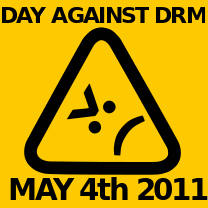DRM (a day against)
Uncategorized Today is a good day to learn about Digital Rights Management, or more accurately Digital Restrictions Management:
Today is a good day to learn about Digital Rights Management, or more accurately Digital Restrictions Management:
- Selection of blog posts from Day Against DRM 2011
- Posts on the Creative Commons blog about DRM, going back to 2004.
- DRM article on English Wikipedia
 Although DRM seems to no longer be the red hot issue it was a decade ago, it is still very much present, causing problems regarding fair use, lack of competition, privacy and security breaches, forced obsolescence, and more. DRM is often now involved in distribution of movies and books, to the great consternation of some librarians. Not listening to librarians puts our freedom and safety at risk.
Although DRM seems to no longer be the red hot issue it was a decade ago, it is still very much present, causing problems regarding fair use, lack of competition, privacy and security breaches, forced obsolescence, and more. DRM is often now involved in distribution of movies and books, to the great consternation of some librarians. Not listening to librarians puts our freedom and safety at risk.
A few things about DRM specific to Creative Commons:
- CC licenses do not allow licensees to use DRM to prevent other licensees from taking advantage of the freedoms the licensor granted. Sounds good, but a license isn’t necessarily the place to put everything good — and the wisdom of this condition has been hotly debated in in years past. We decided not to change it in version 3.0. With discussion of version 4.0 upcoming, should we think about refining the language?
- Read our FAQs regarding DRM and CC.
- DRM puts CC’s values in stark relief. DRM attempts to use technology to make it harder to share and collaborate; we want to use technology to maximize sharing and collaboration. DRM is anti-social, CC is pro-social.
- In the long term, DRM will lose if collaboration and sharing win. This will take decades, or perhaps not so long if you get involved in open culture, education, government, science and our older cousins in the free software movement (who have spearheaded this Day Against DRM).